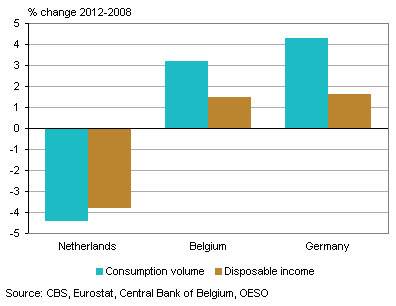Household consumption down in the Netherlands, up in adjacent countries

The sustained downturn in household consumption in the Netherlands in recent years has frustrated economic growth. Households cut back on spending because their incomes do not allow them to spend more. The situation is different in Belgium and Germany where incomes and consumer spending are up.
Consumption and income developments

Declining incomes
Since the onset of the credit crunch in 2008, household consumption in the Netherlands has fallen by 4.4 percent over the period 2008-2012. In Belgium, consumption grew by 3.2 percent over the same period and in Germany by 4.3 percent. The real disposable household income in the Netherlands fell by 3.8 percent in the period 2008-2012, while incomes in Belgium and Germany improved marginally by 1.5 and 1.6 percent respectively.
Faltering consumer confidence
Apart from the declining disposable income, the ongoing downtrend on the housing market and the dramatically reduced consumer confidence accounted for the consumption slump. Consumers’ expectations on their own financial situation over the next twelve months have deteriorated rapidly since mid-2011. Since then, few people believe their own financial situation is likely to improve soon. The mood in the adjacent countries has hardly changed since mid-2011. Financial expectations vary from slightly negative in Belgium to slightly positive in Germany.
Anticipated own financial situation over the next 12 months

Consumption alcohol and tobacco dramatically down
The Dutch have spent less on alcohol, tobacco, home furnishing articles and in hotels and restaurants in recent years, whereas spending was up in the neighbouring countries. As residential property prices in the Netherlands dropped considerably and home sales were dramatically down, consumers also spent less on home furnishing. Belgium and Germany are not faced with similar problems on the housing market. In both countries, residential property prices are still rising modestly.
Reduced spending on alcohol and tobacco is caused by declining incomes and substantial price increases. Partly due to higher excise duties, the average price of tobacco products in the Netherlands rose by nearly 30 percent versus approximately 10 percent in Belgium and Germany.
Spending on various categories of goods

Wouter Jonkers and Frank Notten